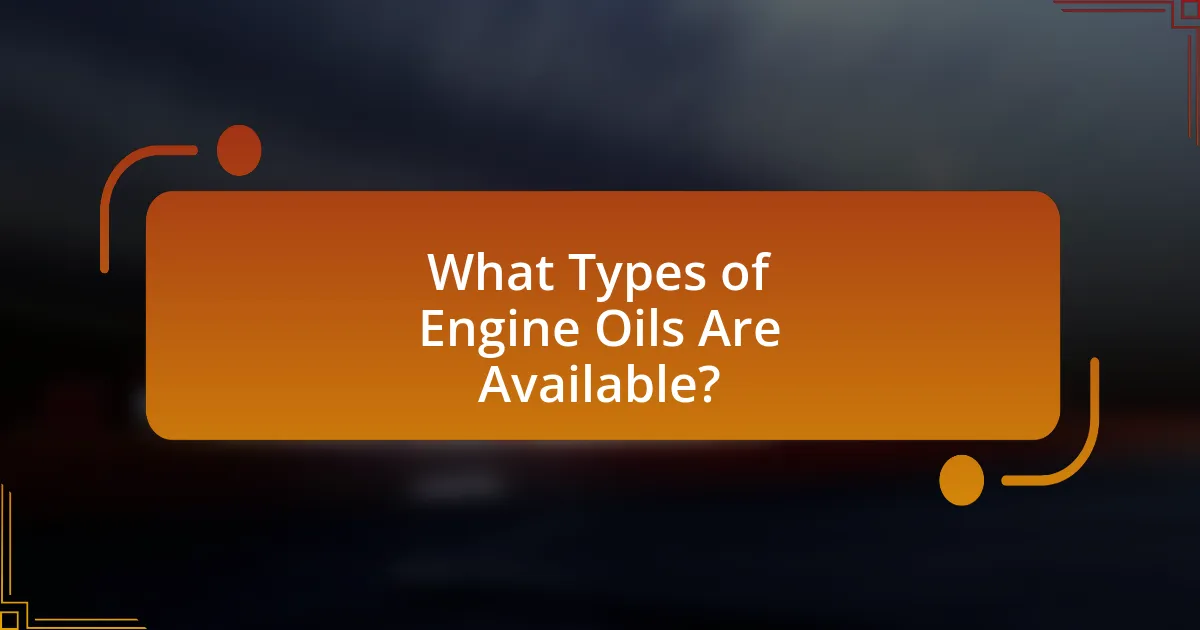Choosing the right engine oil for your vehicle is crucial for maintaining optimal engine performance and longevity. Key factors to consider include viscosity grade, oil type (conventional, synthetic, or blend), and manufacturer specifications. The article outlines how engine type, age, and oil viscosity ratings influence oil selection, as well as the differences between gasoline and diesel engine oils. It also discusses the importance of adhering to API and SAE ratings, the role of additives in enhancing oil performance, and environmental considerations related to oil disposal. Additionally, best practices for oil maintenance and common mistakes to avoid when selecting engine oil are highlighted to ensure proper engine care.

What Factors Should You Consider When Choosing Engine Oil?
When choosing engine oil, consider the viscosity grade, oil type, and manufacturer specifications. Viscosity grade, indicated by numbers such as 5W-30, affects the oil’s flow at different temperatures, ensuring optimal engine performance. The oil type, whether conventional, synthetic, or a blend, impacts engine protection and efficiency; synthetic oils generally provide better performance under extreme conditions. Manufacturer specifications, often found in the vehicle’s owner manual, ensure compatibility and adherence to warranty requirements. Following these factors helps maintain engine health and performance.
How does the type of engine affect oil selection?
The type of engine significantly affects oil selection due to variations in design, operating conditions, and performance requirements. For instance, gasoline engines typically require lighter oils with lower viscosity, such as 5W-30, to ensure efficient fuel economy and proper lubrication at lower temperatures. In contrast, diesel engines often necessitate heavier oils, like 15W-40, to withstand higher pressures and temperatures, as well as to manage soot and contaminants produced during combustion. Additionally, turbocharged engines may require synthetic oils that offer better thermal stability and resistance to breakdown under extreme conditions. These distinctions are supported by manufacturer specifications and industry standards, which outline the appropriate oil types for different engine designs to optimize performance and longevity.
What are the differences between gasoline and diesel engine oils?
Gasoline and diesel engine oils differ primarily in their formulation and performance characteristics. Gasoline engine oils are designed for lighter-duty engines, focusing on high-temperature performance and volatility, while diesel engine oils contain additives that enhance their ability to handle higher levels of soot and contaminants produced by diesel combustion.
Diesel engine oils typically have a higher viscosity and contain detergents and dispersants to manage soot and prevent sludge buildup, which is crucial due to the higher particulate emissions from diesel engines. Additionally, diesel oils often meet more stringent specifications, such as API CK-4 or FA-4, which are tailored for the unique demands of diesel engines, including better oxidation stability and thermal resistance.
In contrast, gasoline engine oils adhere to specifications like API SN or SP, which prioritize fuel economy and engine cleanliness under lighter operating conditions. The differences in these oils are essential for ensuring optimal engine performance and longevity, as using the wrong type can lead to increased wear and potential engine damage.
How does engine age influence oil choice?
Engine age significantly influences oil choice by determining the viscosity and formulation required for optimal performance. Older engines often have increased wear and tear, leading to larger tolerances and potential oil leaks, which necessitate the use of higher viscosity oils or those with additives designed to reduce consumption and improve sealing. For instance, a study by the American Petroleum Institute indicates that older engines benefit from oils with higher viscosity ratings, such as 10W-40, compared to newer engines that may require lower viscosity oils like 5W-30 for better fuel efficiency and engine protection.
What are the different oil viscosity ratings?
Oil viscosity ratings are classified primarily by the Society of Automotive Engineers (SAE) and are indicated by a number followed by the letter “W” for winter, such as 5W-30. The first number represents the oil’s viscosity at low temperatures, while the second number indicates its viscosity at high temperatures. Common viscosity ratings include 0W, 5W, 10W, 15W, 20W, 30, 40, and 50, with lower numbers suitable for colder climates and higher numbers for warmer conditions. This classification helps ensure optimal engine performance and protection under varying temperature conditions.
How do viscosity ratings impact engine performance?
Viscosity ratings significantly impact engine performance by determining how well the oil flows at various temperatures. Higher viscosity ratings indicate thicker oil, which can provide better protection at high temperatures but may lead to increased resistance and reduced fuel efficiency at lower temperatures. Conversely, lower viscosity ratings allow for easier flow during cold starts, enhancing fuel economy and reducing wear during initial engine operation. Research shows that using the correct viscosity oil can improve engine efficiency by up to 2% and extend engine life by minimizing friction and wear, as noted in studies by the American Petroleum Institute.
What do the numbers on oil labels mean?
The numbers on oil labels indicate the oil’s viscosity, which describes its thickness and flow characteristics at different temperatures. For example, in a label marked 5W-30, the “5W” signifies the oil’s viscosity at low temperatures (the “W” stands for winter), while “30” indicates its viscosity at high temperatures. This classification follows the Society of Automotive Engineers (SAE) standards, which help ensure that the oil performs effectively under varying conditions. The viscosity ratings are crucial for engine protection and efficiency, as they determine how well the oil can lubricate engine components during cold starts and at operating temperatures.
Why is the oil specification important?
The oil specification is important because it ensures that the engine oil meets the specific requirements of a vehicle’s engine, promoting optimal performance and longevity. Engine oils are formulated with various additives and base oils that must align with the manufacturer’s standards to provide adequate lubrication, reduce wear, and prevent sludge buildup. For instance, using oil that meets the API (American Petroleum Institute) standards guarantees that the oil has been tested for quality and performance, which is crucial for maintaining engine efficiency and preventing damage.
What are API and SAE ratings?
API ratings refer to the American Petroleum Institute’s classification system for engine oils, which indicates the oil’s performance level and suitability for specific engine types. SAE ratings, established by the Society of Automotive Engineers, denote the oil’s viscosity grade, indicating how thick or thin the oil is at certain temperatures. For example, an oil rated SAE 5W-30 has a viscosity of 5 at low temperatures and 30 at high temperatures, ensuring optimal engine protection and performance. These ratings help consumers select the appropriate oil for their vehicles, ensuring compatibility and efficiency.
How do manufacturer recommendations guide oil selection?
Manufacturer recommendations guide oil selection by specifying the appropriate viscosity and performance standards required for optimal engine function. These recommendations are based on extensive testing and engineering analysis, ensuring that the oil meets the specific needs of the engine under various operating conditions. For instance, manufacturers often refer to industry standards such as API (American Petroleum Institute) and ILSAC (International Lubricant Standardization and Approval Committee) to define the quality and performance levels of the oil suitable for their vehicles. Following these guidelines helps maintain engine efficiency, prolongs engine life, and ensures compliance with warranty requirements.

What Types of Engine Oils Are Available?
There are several types of engine oils available, including conventional, synthetic, synthetic blend, and high-mileage oils. Conventional oil is derived from crude oil and is suitable for older vehicles with simple engine designs. Synthetic oil, on the other hand, is chemically engineered to provide superior performance and protection, particularly in extreme temperatures. Synthetic blend oil combines both conventional and synthetic oils, offering a balance of performance and cost. High-mileage oil is formulated for vehicles with over 75,000 miles, containing additives that help reduce oil consumption and engine wear. These distinctions are crucial for selecting the appropriate oil based on vehicle age, engine type, and driving conditions.
What are the main categories of engine oil?
The main categories of engine oil are conventional, synthetic, and synthetic blend. Conventional oil is derived from crude oil and is suitable for standard engines, while synthetic oil is chemically engineered for high performance and better protection under extreme conditions. Synthetic blend oil combines both conventional and synthetic oils, offering enhanced protection and performance at a lower cost than full synthetic oil. These categories are essential for selecting the appropriate oil based on vehicle requirements and driving conditions.
What is the difference between synthetic and conventional oils?
Synthetic oils are artificially made using chemical compounds, while conventional oils are derived from crude oil through refining processes. Synthetic oils typically offer better performance in extreme temperatures, improved engine protection, and longer intervals between oil changes compared to conventional oils. For instance, synthetic oils can withstand higher temperatures without breaking down, which enhances engine longevity and efficiency. Additionally, synthetic oils often contain fewer impurities than conventional oils, leading to cleaner engine operation and reduced sludge buildup.
What are the benefits of using high-mileage oil?
High-mileage oil offers several benefits for vehicles with over 75,000 miles on the odometer. This specialized oil contains additives designed to reduce engine wear, prevent leaks, and improve overall engine performance. Specifically, high-mileage oil includes seal conditioners that help rejuvenate aging seals, thereby minimizing oil consumption and leaks. Additionally, it often has a higher viscosity, which can provide better lubrication and protection for older engines. Studies indicate that using high-mileage oil can lead to improved fuel efficiency and extended engine life, making it a practical choice for aging vehicles.
How do additives in engine oil affect performance?
Additives in engine oil significantly enhance performance by improving lubrication, reducing friction, and preventing wear. These additives, such as detergents, dispersants, anti-wear agents, and viscosity index improvers, work together to maintain engine cleanliness, optimize oil flow, and protect engine components under various operating conditions. For instance, anti-wear additives form a protective layer on metal surfaces, which can reduce wear by up to 50%, thereby extending engine life. Additionally, detergents help keep engine parts clean by preventing sludge and deposit formation, which can improve overall efficiency and performance.
What are common additives found in engine oils?
Common additives found in engine oils include detergents, dispersants, anti-wear agents, viscosity index improvers, and antioxidants. Detergents help keep engine parts clean by preventing sludge and deposits, while dispersants maintain the stability of contaminants in the oil. Anti-wear agents, such as zinc dialkyldithiophosphate, form a protective layer on metal surfaces to reduce friction and wear. Viscosity index improvers enhance the oil’s viscosity stability across temperature ranges, and antioxidants prevent oxidation, extending the oil’s life. These additives are essential for maintaining engine performance and longevity.
How do additives enhance engine protection?
Additives enhance engine protection by improving lubrication, reducing friction, and preventing wear. These chemical compounds work by forming a protective layer on engine components, which minimizes direct metal-to-metal contact. For instance, anti-wear additives like zinc dialkyldithiophosphate (ZDDP) create a film that protects surfaces during high-stress conditions, thereby extending engine life. Additionally, detergents in engine oil additives help keep engine parts clean by preventing sludge and deposit formation, which can lead to overheating and damage. This combination of enhanced lubrication and cleanliness is crucial for maintaining optimal engine performance and longevity.
What are the environmental considerations when choosing engine oil?
When choosing engine oil, environmental considerations include the oil’s biodegradability, toxicity, and the impact of its production and disposal. Biodegradable oils, often derived from renewable resources, break down more easily in the environment, reducing pollution. Toxicity levels of engine oils can affect aquatic life and soil health; thus, selecting oils with lower toxicity is crucial. Additionally, the production process of synthetic oils can involve significant energy consumption and emissions, making it important to consider oils that are produced with lower environmental impact. For instance, according to the American Petroleum Institute, using high-quality synthetic oils can lead to longer intervals between oil changes, which reduces waste and environmental burden.
How do biodegradable oils compare to traditional oils?
Biodegradable oils are generally more environmentally friendly compared to traditional oils, as they break down more easily in nature, reducing pollution and ecological harm. Traditional oils, often derived from petroleum, can persist in the environment for extended periods, leading to potential soil and water contamination. Studies indicate that biodegradable oils can decompose within weeks to months, while conventional oils may take years to degrade. Additionally, biodegradable oils are often made from renewable resources, such as vegetable oils, which further supports sustainability efforts.
What impact does oil disposal have on the environment?
Oil disposal has a significant negative impact on the environment, primarily through soil and water contamination. When improperly disposed of, used oil can seep into the ground, leading to soil degradation and the leaching of harmful chemicals into groundwater. According to the U.S. Environmental Protection Agency, one quart of used oil can contaminate up to 250,000 gallons of water, illustrating the severe potential for water pollution. Additionally, oil spills can harm aquatic ecosystems, affecting marine life and disrupting habitats. The accumulation of toxic substances from oil can lead to long-term ecological damage, making responsible disposal practices essential for environmental protection.

How Can You Determine the Right Engine Oil for Your Vehicle?
To determine the right engine oil for your vehicle, consult your owner’s manual for the manufacturer’s specifications regarding oil type, viscosity, and certification standards. The manual provides essential information, such as whether to use synthetic or conventional oil and the appropriate viscosity rating, typically expressed in numbers like 5W-30. Following these guidelines ensures optimal engine performance and longevity, as manufacturers design engines to operate best with specific oil formulations. Additionally, the American Petroleum Institute (API) provides certification ratings that indicate oil quality, further validating the choice of oil based on your vehicle’s requirements.
What steps should you take to select the right oil?
To select the right oil for your vehicle, first, consult your owner’s manual to identify the recommended oil type and viscosity grade. This ensures compatibility with your engine’s specifications. Next, consider the oil’s performance ratings, such as API (American Petroleum Institute) and ILSAC (International Lubricant Standardization and Approval Committee) classifications, which indicate the oil’s quality and suitability for your engine. Additionally, evaluate whether you need synthetic, conventional, or a blend based on your driving conditions and climate; synthetic oils generally provide better performance in extreme temperatures. Finally, check for any manufacturer-specific requirements, as some vehicles may require oils that meet certain standards or specifications.
How can you check your vehicle’s owner manual for oil specifications?
To check your vehicle’s owner manual for oil specifications, locate the manual either in the glove compartment or online through the manufacturer’s website. The owner manual contains a section specifically detailing the recommended oil type, viscosity, and any specific standards that must be met, such as API or ILSAC ratings. This information is crucial for ensuring optimal engine performance and longevity, as using the correct oil specifications is essential for maintaining engine health.
What tools can help you assess your engine’s oil needs?
To assess your engine’s oil needs, you can use an oil dipstick, an oil pressure gauge, and an oil analysis kit. The oil dipstick allows you to check the oil level and condition, indicating whether a change is necessary. An oil pressure gauge measures the oil pressure in the engine, which can signal if the oil is circulating properly. An oil analysis kit provides a detailed report on the oil’s condition, including contaminants and wear metals, helping you determine if the oil is still effective or needs replacement. These tools are essential for maintaining optimal engine performance and longevity.
What are common mistakes to avoid when choosing engine oil?
Common mistakes to avoid when choosing engine oil include selecting the wrong viscosity grade, ignoring manufacturer specifications, and using oil not suited for the vehicle’s engine type. Choosing the incorrect viscosity can lead to inadequate lubrication, as oil that is too thick or too thin may not perform optimally under varying temperatures. Ignoring manufacturer specifications can result in using oil that does not meet the necessary performance standards, potentially causing engine damage. Additionally, using conventional oil in a vehicle designed for synthetic oil can lead to reduced engine efficiency and longevity. These mistakes can significantly impact engine performance and lifespan.
How can using the wrong oil affect your vehicle?
Using the wrong oil can lead to significant engine damage and decreased performance in your vehicle. Incorrect oil viscosity or formulation may result in inadequate lubrication, causing increased friction and wear on engine components. For instance, using oil with a lower viscosity than recommended can lead to oil starvation, especially in high-temperature conditions, which can cause overheating and potential engine failure. Additionally, using oil not formulated for your engine type can lead to sludge buildup, reduced fuel efficiency, and ultimately, costly repairs. Studies indicate that improper oil selection can reduce engine lifespan by up to 30%, highlighting the critical importance of using the correct oil for optimal vehicle performance.
What should you consider when switching oil types?
When switching oil types, you should consider the viscosity rating, the oil’s formulation (conventional, synthetic, or blend), and the manufacturer’s specifications for your vehicle. The viscosity rating, indicated by numbers such as 5W-30, affects how well the oil flows at different temperatures, which is crucial for engine performance. The formulation impacts the oil’s ability to protect against wear and deposits; for instance, synthetic oils generally offer better protection and performance under extreme conditions compared to conventional oils. Additionally, adhering to the manufacturer’s specifications ensures compatibility with engine components and maintains warranty coverage.
What are some best practices for maintaining engine oil?
Regularly checking and changing engine oil is essential for optimal engine performance. Engine oil should be checked at least once a month or before long trips to ensure it is at the proper level and free of contaminants. Additionally, changing the oil according to the manufacturer’s recommended intervals, typically every 3,000 to 7,500 miles depending on the oil type, helps maintain engine health. Using the correct oil type, as specified in the vehicle’s manual, ensures compatibility and efficiency. Furthermore, monitoring oil color and consistency can indicate when it needs changing; clean oil is typically amber, while dark or gritty oil suggests it is time for a change. Regular maintenance of the oil filter during oil changes also contributes to better engine performance by preventing debris from circulating in the engine.
How often should you change your engine oil?
You should change your engine oil every 5,000 to 7,500 miles for conventional oil and every 7,500 to 10,000 miles for synthetic oil. This recommendation is based on the guidelines provided by major automotive manufacturers and industry experts, which emphasize that regular oil changes help maintain engine performance and longevity. For example, the American Automobile Association (AAA) suggests that adhering to these intervals can prevent engine wear and improve fuel efficiency.
What tips can help you extend the life of your engine oil?
To extend the life of your engine oil, regularly check and maintain proper oil levels and change the oil according to the manufacturer’s recommendations. Regularly monitoring oil levels ensures that the engine is adequately lubricated, preventing excessive wear and tear. Changing the oil at recommended intervals, typically every 3,000 to 7,500 miles depending on the oil type and vehicle, helps remove contaminants and maintain oil effectiveness. Additionally, using high-quality oil that meets or exceeds the specifications set by the vehicle manufacturer can significantly enhance oil longevity and engine performance.


